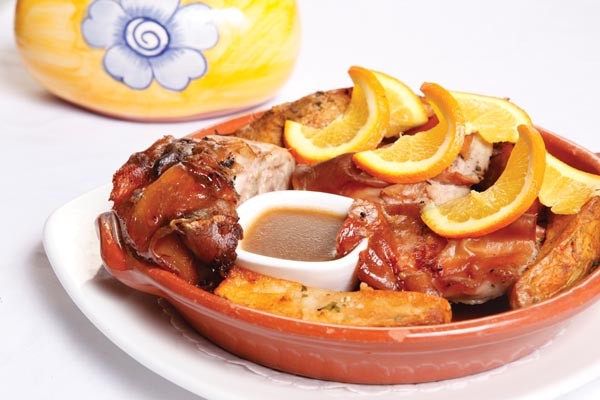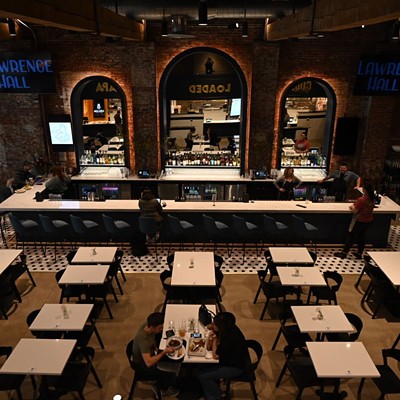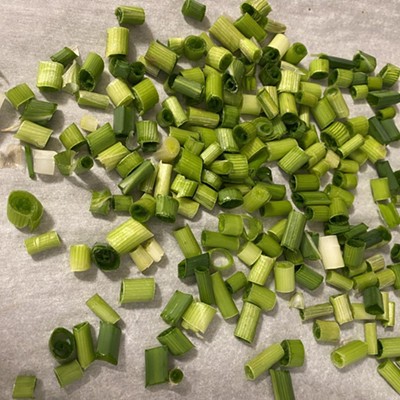Years ago and in another city, Angelique once lived in a Portuguese immigrant neighborhood. There she developed a taste for the cuisine of this ancient, seafaring culture. Part of the appeal was that, while traditional Continental cooking most often treats seafood with a delicate, even tentative touch, the Portuguese have no fear of combining their copious catch with spicy, bold and, truth be told, occasionally heavy flavors. The results have a certain affinity with Spanish food, but there's no missing the distinctive, rough-and-ready culture of Europe's westernmost coast.
So, even as Pittsburgh has gained destinations for dining on Spanish tapas, various cuisines from Africa and even a take-out counter serving street eats from some of the world's conflict-riven countries, there has been an absence of Portuguese restaurants in local dining ... until now. Claudio Pereira, the scion of Pittsburgh's longest-running Spanish restaurant, Mallorca, and its sister tapas and wine bar, Ibiza, has opened a restaurant in Aspinwall with partner (and former Mallorca employee) Francisco Buxaruo. This new venture finally gives Pittsburghers a place to experience traditional Portuguese cuisine.
Diners at Marisqueira also receive the full experience of a traditional, Continental-style restaurant, including swank surroundings (Marisqueira has taken over the former Mio wine-bar space with few modifications); a comprehensive menu organized in the classic fashion by protein; and attentive, professional service. The food could be burgers and fries, and there would still be something intoxicating about a fleet of servers in formalwear gliding about your table, bringing whatever you need practically before you request it.
But the luxury of dining at Marisqueira doesn't stop at the front of the house. What comes out of the kitchen — also staffed by Mallorca alums — is diverse, engaging and consistently high quality. Its Portuguese menu is the real deal: There is no fusion with other cuisines, and therefore no opportunity to turn out generic dishes that are Portuguese more in name than in preparation.
In other words, when you order calamari, don't expect deep-fried rings of squid with cup of marinara or aioli on the side. What you'll get at Marisqueira is a reminder that the coastal cuisines of southern Europe get a lot more mileage from cephalopods than we do. Polvo a marisqueira was an extraordinary dish of thick, meaty Iberian octopus tentacles, broiled with Portuguese bleu cheese to create a thin, crispy skin and a bold, tangy, creamy sauce. The overall effect was not unlike bleu cheese on a steak ... if steak were a sea creature, now swimming in fragrant olive oil.
Black-eyed peas took on a more complex character as well. In the States, they tend to be handled as hearty ballast, often cooked to mush with pork, but Marisqueira's kitchen prepared them simply and perfectly, tender yet firm as the basis for a salad with diced tomatoes, shredded lettuce and cilantro. A light delicate dressing finished the plate, which was simultaneously refreshing and satisfying.
Another starter was a fat link of linguica sausage, flambéed en route to the table and then sliced and served. The sausage's brief encounter with fire added delicious char without creating a tough exterior, and the interior was smoky, spicy and a bit rustic, with a coarse grind of pork. The immediacy of this preparation provided a different kind of freshness than that of, say, the fresh produce in a salad; the just-released flavors were hot and juicy in our mouths.
Pan-seared New York strip steak with ham and fried egg on top, served with sliced fried potatoes in a red-wine pan sauce, underscored the traditional robustness of Portuguese cuisine. The ham wasn't too salty — a frequent flaw in meat-on-meat cooking — and the sauce offered just a touch of sweetness to balance all of the hearty, smoky flavors. The steak was well cooked, its beefiness and tenderness shining through its blanket of accompanying proteins.
Chicken piripiri — cooked with Portuguese chili peppers — was bold in another way: The pepper's piquancy infused the moist, well-browned, bone-in chicken with its subtle heat, balancing with sweet paprika and aromatic herbs. And porco with clams was an excellent example of Portugal's fearless approach to seafood. Large chunks of pork, a bit lean but still moist, shared a rich, slightly spicy sauce with in-shell clams. The shellfish provided both textural and flavor contrast, the tender, briny-sweet flesh brightening the stew-like concoction. Potatoes, cauliflower and tomato rounded out this satisfying, one-dish meal.
A daily special of bronzini offered a more familiar fish preparation. A whole fish was grilled and served from the bone at the table, finished with a light butter sauce. While we wouldn't have minded a touch of char from the grill, the skin was crisp, the flesh was moist and light, and a bed of rice with peas and corn was a beautifully cooked and perfectly suited accompaniment.
We had only one, small disappointment at Marisqueira: grelos, translated on the menu as broccoli rabe mousse, was more like straight-up sautéed broccoli rabe, and as bitter as that description suggests. However, this one bitter note couldn't bring down a meal that otherwise soared with the bold flavors and confident preparations of classic Portuguese cuisine.













